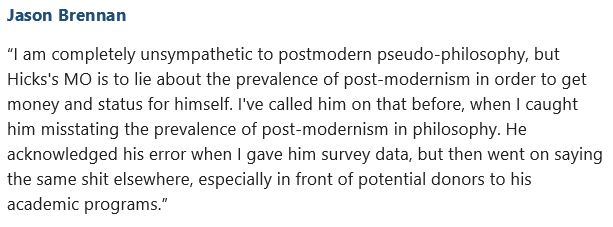Jason Brennan, a younger philosopher at Georgetown, has taken occasional swipes at me on Facebook and other forums. The last time he did so, I responded publicly, which led to some back and forth argument. Not happy with the direction of the discussion, Brennan then deleted the entire thread. So this time I’m posting his latest comment and responding here, so the exchange will survive in the public eye. Here’s his comment:

My response:
1. On the prevalence of post-modernism in philosophy: My view, stated dozens of times in podcasts, lectures, and other media outlets, is that philosophy is currently relatively healthy. The postmodern arguments were developed in philosophy half a century ago, when philosophy was in a much more skeptical phase. But then those arguments were taken over by other departments and disciplines while philosophy moved on in more positive directions. So the prevalence of pomo is now mostly not in philosophy. So advice to Brennan: Pay attention, please, and do a little research on people before attacking.
2. On survey data: I gave a talk at an APEE conference to mostly economists. I made the point that according to survey data, Kant and Hume were most influential on the current generation of professional philosophers (Aristotle is third), and that had been a trend for the last century. I argued that this is significant because (a) Kant and Hume both offer variations on the fact/value dichotomy, (b) three greatly admired economists of the APEE group, Mises, Hayek, and Friedman, all accepted versions of the fact/value dichotomy, and that (c) that was a problem because it makes it hard or impossible to argue that free markets are a value based on economic facts if you’ve sundered fact and value. In the question period, Brennan referred to the same survey data, indicating that it also pointed out that contemporary philosophers don’t necessarily buy into the Hume/Kant fact/value dichotomies in as strong a form and/or are drawing from other key Humean and Kantian theses. I agreed with Brennan about the current generation of philosophers, but pointed out that my talk focused on the state of thinking in the 1920s, 30s, and 40s, when the philosophically alert economists Mises, Hayek, and Friedman were doing their core work and when they picked up on very robust Humean/Kantian fact/value dichotomies then very prevalent among the leading philosophers. Note: The topic was not postmodernism.
3. On calling out, lying, and shit: Note that in the above Brennan both fails to grasp the position he’s attacking and then shifts to attacking the person in strong terms. Why not have an open discussion about just how prevalent pomo is? I’ve several times publicly said it would be great to have better demographic data on that, as we mostly make judgment calls based on anecdotes. Yet Brennan name-calls judgments that differ from his own “lies” and “shit.” Of course, any of us can be over- or under-estimating the current power of pomo, but why can’t those be honest mis-judgments? Also, how will we discover the best judgment if we simply insult each other’s character? A philosopher knows better.
4. On “in front of potential donors to his academic programs”: The academic program I run at my university is the Center for Ethics and Entrepreneurship. As its name suggests, it focuses on entrepreneurship and (mostly) business ethics. Donors who support its work are interested in those topics. The amount of money donated by those interested in postmodernism is approximately zero. Aside from that confusion — I do work in ethics/entrepreneurship and I do work on pomo — Brennan though is stating that my public concerns about postmodernism could only be motivated by fund-raising. I would in fact like to earn more money from my postmodernism expertise (Send checks and buy my books!), but it’s a rather sad ad hominem for Brennan to appeal to unsavory motives rather than addressing the arguments about pomo.
5. Beyond this particular spat: Brennan has a habit of frequently unloading on individuals on social media. It’s unprofessional when he does so to other academics, though there’s a significant amount of pettiness and juvenile “argumentation” among academics, so academics on the receiving end typically learn to take it in stride. But it’s especially unseemly when Brennan does so to amateur intellectuals and other non-professionals on social media, many of whom genuinely want to discuss and argue but who of course make mistakes and lapse into cheap tactics. But we should hold professional philosophers to a higher standard. Brennan’s style of frequent hostility-at-the-drop-of-a-hat may indicate a psychological problem of some sort, in which case he may deserve to be cut some slack, but my sense is that it’s a weakness-of-will character problem, which is a different matter morally.
6. On Brennan as philosopher: The above said, let me close by saying that Brennan is intelligent and sometimes does good philosophy. I’ve read three of his pieces and heard him lecture twice, and here is my two-fold assessment. On applied issues in ethics and political philosophy he is a clear writer, thoughtful, and worth reading. But when he turns to fundamental issues in philosophy — meta-ethics, epistemology, and ontology — he quickly becomes middling and confused. His formal training in philosophy was in applied philosophy, so it makes sense that he is strongest there. And of course, none of us can know everything, so it’s not a criticism to say he’s weak on fundamental philosophy. But it should be part of a professional philosopher’s self-reflection to realize when he does not know what he is talking about and to become more appropriately modest in formulation. Further, being a good philosopher is about character as well as intelligence and knowledge. Brennan’s online person, with his rather frequent bullying attempts, assumed arrogance, and status grubbing combined with sloppy reporting, mis-remembering, and uncharitable construction is very much out of line.

Steve, you lied about pomo–including getting quotes wrong in your book Nancy MacLean-style, you lied about the prevalence of pomo, you lied about how much you stated the prevalence of pomo, and now you for some reason mistate what my training is (it wasn’t in applied philosophy) and act as if you are somehow a greater expert on these issues than I am. Your work indicates you are largely just restated Rand’s incompetent misrepresentations.
I don’t have a vendetta against you, but what you are doing is bad and you should feel bad. If someone brings you up on facebook, I’ll continue to point out that your MO is sell hack philosophy to people who don’t know better.
1. You disagree with Stephen about postmodernism. Why say “he lied about the prevalence of postmodernism” instead of “we disagree about this issue. He thinks x. I think y.” That’s what we academics do. We disagree. We discuss arguments and data. Why be a smarmy cunt?
2. I don’t see Stephen making outrageous statements about the prevalence of postmodernism. Your criticisms lack any specifics.
3. You say Stephen is “repeating Rand’s incompetent misrepresentations.” Where? What are they? Why are they incompetent? What about Stephen’s arguments? What are your arguments? Again, lacking any specifics, how am I, a third party onlooker, supposed to judge your comments?
4. Again, why not just “Stephen thinks x, and here’s why. I think y and here’s why. We disagree. Let’s discuss.” Why “he’s a liar and bad and should feel bad”? You’re just being silly. Do you think this is proper academic courtesy? Why should anyone interested in these topics do anything other than ignore you and go about our research?
Hicks gives examples. Brennan spews animosity and resentment. The interesting psychological questions is why Brennan thinks he is harmed by Hicks’ opinions and activities?
Dr. Hicks, is it possible to find online, or get, a copy of your APEE talk concerning the fact/value dichotomy and its acceptance by economists?
Jason Brennan, any properly schooled philosopher knows or SHOULD know that mind reading is not a valid method of epistemology. You should therefore be extremely careful about trying to claim special insight into someone’s intentions or inner thoughts. I expect such careless epistemology from teenagers and other untrained people. To see it in someone who calls himself a professional thinker is mind boggling.
I appreciate you calling this behavior out. Having been on the receiving end of Brennan’s outbursts – which even escalated to the point of false accusations of plagiarism and theft – I also concluded that he’s probably got some underlying psychological issues.
In the middle of our spat, I received messages from multiple academics also saying they’d been personally attacked by him. So this is apparently not unique.
Hi Jack: The talk is in outline form only, and unpublished. Eventually it will be available. Thanks for your interest.
From an interested onlooker with a public high school “degree”😂. However, while it’s clear Mr. Brennan is highly educated and very intelligent, he is appears to have a extremely arrogant and VERY immature. Not someone that you can take seriously.